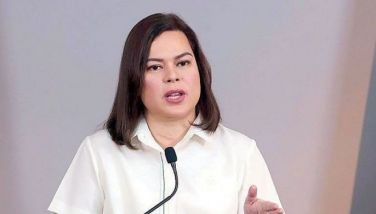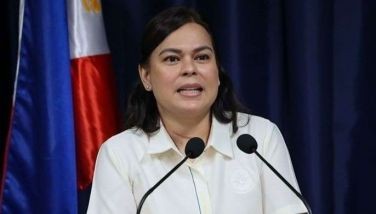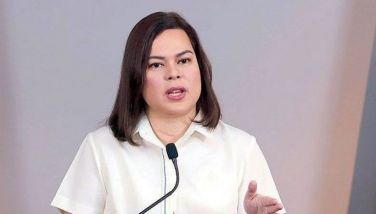Shame and outrage

The first post martial law Senate was an electric showground. After 15 years of seeing congressional prerogatives fused with the Executive, the national members of the suddenly bicameral legislature realized that a larger challenge had been thrust upon them. More than mere nuts and bolts lawmaking, they needed to reintroduce their institution to a nation and a bureaucracy that had become clueless.
With neophytes finding their footing or just discovering the possibilities of their office, it behooved veteran senators like Raul Manglapus, Jovito Salonga, Mamintal Tamano, John Osmeña, Ernesto Maceda plus Neptali Gonzales (a former congressman) to jumpstart their peers in reestablishing the Senate as a check on the Executive.
In the organization of the chamber, my father found himself as the 1987 Senate’s first education committee chair. Education, especially the cause of teachers, was a lifelong advocacy. He was the son of public school teachers. His father, Manila schools superintendent Antonio Maceda, was a proud graduate of the Philippine Normal College (PNC) as were the parents of president Ferdinand Marcos, the mothers of presidents Corazon Aquino and Fidel Ramos, among others. Sen. Maceda was the main author of the law elevating the PNC to University status (PNU).
As education chair, one of the first initiatives to which he loaned his voice was to rectify a glaring budget anomaly. In the executive budget presented to Congress, he noted that the largest component was still the total appropriation for the military. Given the revolutionary means through which the administration secured power and the 15-year martial law experience, the old habit of obliging the military would not die easy.
Article XIV, Section 5(5) of the Constitution, however, provides that: “The State shall assign the highest budgetary priority to education ...” Under the circumstances, the Senate could have easily chosen inertia. Instead, they decided to demur. Accordingly, the national budget was adjusted to reflect the constitutional mandate.
EDCOM. But their larger contribution to education was to come later, when they actualized the first Congressional Commission on Education (EDCOM). Senator Edgardo Angara, later education committee chair, with Cong. Carlos Padilla from the bigger house, was the spearhead of EDCOM.
We appropriate present Senate education committee chair Sherwin Gatchalian’s words in referencing the EDCOM and its impact on education: “… this extraordinary application of participatory governance and inclusive policymaking, EDCOM 1 crafted the 1991 EDCOM Report – one of the most influential congressional reports ever published. This report set into motion several of the most impactful education reforms over the past few decades. Foremost among them was the breaking up of the monolithic Department of Education, Culture and Sports in favor of the DepEd-CHED-TESDA trifocalization that exists today.”
Casus belli. Sen. Gatchalian has proved himself a worthy heir to his predecessors’ initiatives and he has led the charge in the Senate to see about putting together another EDCOM. The immediate trigger is the poor performance of our students in the (1) Programme for International Student Assessment or PISA, (2) Trends in International Mathematics and Science Study or TIMMS and (3) Southeast Asia Primary learning matrix or SEA PLM. This comes on top of the dismal results in metrics across the board. For example, 90.5 percent of children in the 10-year-old age group can’t read and understand a simple story. According to the World Bank, this learning poverty will just get worse.
Thirty years ago, Sen. Leticia Ramos Shahani, who also became education committee chair, observed that “we want a grade 6 graduate who has learned 100 percent of what six years of schooling stands for and high school graduates, the knowledge and skills that additional years stand for.”
The pandemic school closures have exacerbated the situation. Sen. Gatchalian is seeing the potential collapse of the education system. In the Senate, he expressed his shame and outrage at how our education system has failed entire generations of learners.
DepEd Secretary Leonor Briones has been on beast mode implementing key reforms, including updating the K-12 curriculum and touching base with top performing schools. But the Senate, the private sector and all stakeholders agree that the solution to this crisis is broader, system-wide reform. Hence, SB 2485 “An Act Creating a Second Congressional Commission on Education to Assess and Evaluate the State of Philippine Education and Recommend Innovative and Targeted Reforms in Education ... ” co-authored by Senators Angara, Drilon, Poe, Villanueva and Marcos. This is Sen. Gatchalian’s EDCOM 2.
Technological advancement now allows direct consultation with education and policy experts on a grander scale than EDCOM 1. The bill targets a menu of reforms, including some of the same of EDCOM 1’s 30 major program recommendations which were not adopted (only 13 were).
Plus ça change. But the starting point should be teacher training. Art XIV Sec. 5(5), which we cited above, supplies the constitutional north star: “The State shall assign the highest budgetary priority to education and ensure that teaching will attract and retain its rightful share of the best available talents through adequate remuneration and other means of job satisfaction and fulfillment.”
EDCOM 1 cited poor teacher training, the quality of students enrolled in teacher training and meager opportunities for professional development as the root of the teacher fail. Today, the same issues still haunt us.
It is a tragedy when learners don’t learn. It is a crime when teachers can’t teach. Sen. Gatchalian quotes a World Bank study that, but for English elementary teachers, “the average elementary or high school teacher could correctly answer fewer than half of questions on subject content tests.”
Sec. Briones has been vigilant not only with the curriculum of learners. She has identified also the educational gap in the curriculum of teachers. It is essential that DepEd supply inputs on how universities and colleges train their education majors.
Sen. Shahani reminded us that “quality seeks its own level. Quality students can only be produced by quality teachers.” At bottom, our road to redemption lies in the hands of a well-educated and trained populace fully committed to the national rebuilding to come.
- Latest
- Trending





























